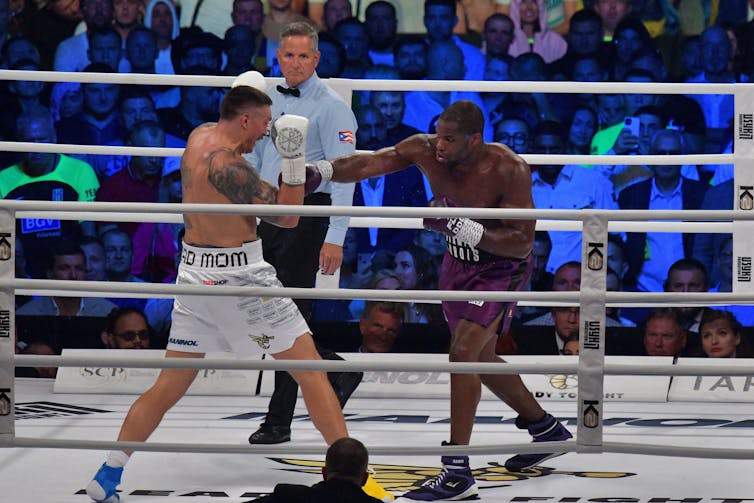Boxing, “the sweet science”is a theater of skill, power and drama that has captivated audiences for centuries. Yet behind the allure of championship nights and historic rivalries lies a lingering shadow: controversial decisions which triggers cries of “flight”.
Boxing has had its fair share of controversial decisions that continue to spark debate among fans and experts. While technology in sports like football and cricket has supplemented objective rules, boxing’s reliance on subjective judgment makes it particularly vulnerable to bias and error. Isn’t it time for sport to catch up?
The answer may lie in artificial intelligence (AI). Imagine a world where contentious decisions and accusations of bias are a thing of the past. Could technology provide boxing with the fairness and transparency it desperately needs?
The history of boxing is long and rich, dating back to bare-knuckle fighting and evolving into the regulated global phenomenon it is today. But some things haven’t changed. The main one is the subjective nature of the judgment. Unlike football’s offside or cricket’s LBW (leg before wicket) calls, boxing lacks hard and fast rules for scoring.
Decisions depend on referees and judges’ interpretation of abstract criteria such as effective aggression, defense and clean punching. Although these standards seem simple, their application often varies wildly, leading to unpredictable results.
Take the infamous 2012 Olympics, which featured many controversies over grading this led to demands for reform. Most recently, during the Oleksandr Usyk vs. Daniel Dubois fight, the referee ruled that Dubois had thrown a low blow for Usyk. This left fans divided, with some feeling it should have been a legal punch.
This is an example of a key decision that sparked widespread debate in the sport. But there are many others.
Other sports have adopted innovative technology in an attempt to reduce subjectivity: cricket uses ball tracking for accurate decision-making, soccer has VAR (video assistant referee) for contested goals and MMA (mixed martial arts) uses replays for confirm crucial moments. But boxing remains stubbornly dependent on the human gaze. For what? Because its unique pace and nuances present challenges that technology has yet to master.
For fans, what they might consider an unfair decision can be a bitter pill. For the fighters, it’s devastating: years of training undone by a controversial call. And for the sport as a whole, disagreements over decisions can tarnish its credibility.
Boxing is an industry worth billions. Sponsors, broadcasters and pay-per-view audiences demand a product they can trust. Controversies not only upset fans, they jeopardize the sport’s business model. To survive and thrive, boxing must evolve and technology offers a way forward.

Sébastien Borowski / EPA Images
The potential of AI in boxing
What makes AI so promising is its ability to deal with complexities. Rather than replacing human judgment, AI can complement it, bringing much-needed consistency to a sport fraught with interpretation. Technology does not replace humans, it supports them.
So what’s stopping boxing? Critics say tools like replay systems could disrupt the flow of a fight. But smart integration can prevent this. Imagine video reviews used sparingly, only for game-changing moments like knockdowns or contested low blows.
Here’s how technology could reshape boxing. Sensors and AI could track punch accuracy, power and placement. This data would give judges a factual layer to supplement their scoring. AI could also transform instant replays. Key moments, like knockdowns or potential fouls, could be reviewed quickly without disrupting the rhythm of the fight.
Artificial intelligence could also help with scoring. Algorithms trained on historical data could suggest scores based on patterns and metrics, acting as a guide for judges. Finally, blockchain technologywhere a record of decisions is kept on connected computers, could record and secure judges’ scores, creating a transparent record for post-fight analysis.
Progress and tradition
Boxing has always celebrated its traditions, and that is part of its charm. But clinging too closely to the past risks alienating today’s fans. Critics fear that too much technology robs sport of its human dimension. But the goal is not to replace tradition, but to protect it by guaranteeing fairness.
A well-judged fight honors the efforts of the fighters and keeps the fans engaged. Technology, applied judiciously, can achieve this without losing the soul of the sport. It’s not about letting robots take over, but about giving humans better tools to make the right decisions.
Despite Tyson Fury’s dissatisfaction with the “experimental AI scoring system” which dovetailed with the awarding of his recent title fight to opponent Usyk, over time it is possible that more consistent decision-making by AI could build trust in the technology.
Boxing has always been about honor, courage and glory. But to maintain its place in the modern sporting landscape, perhaps it is time to embrace change. AI can help preserve the rich traditions of boxing, while putting fairness at the forefront. With the right tools, boxing can regain its integrity, one right decision at a time.


